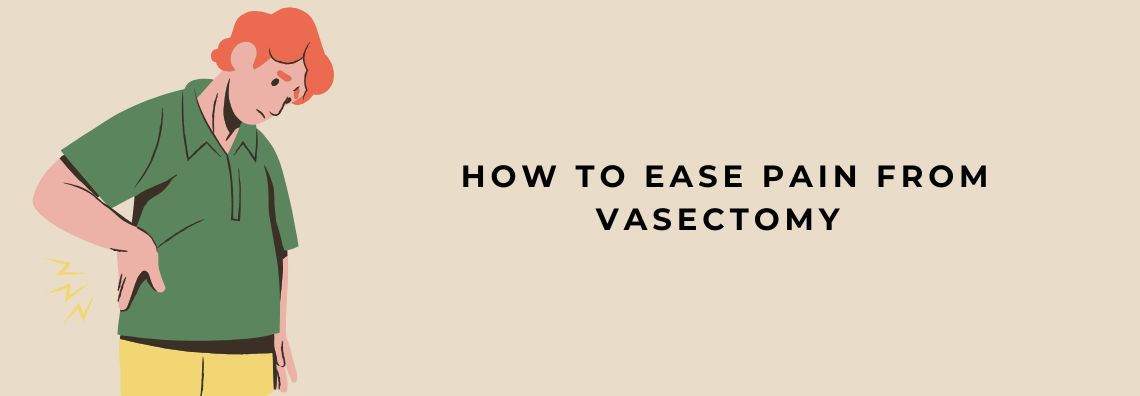
Vasectomy is considered one of the most suitable and reliable male birth control procedures. Ice packs and over-the-counter medications like ibuprofen can be at the top of the list in a matter of easing pain from vasectomy. Pain medication, scrotal support and other pain relief techniques will be discussed in this guide.
Aftercare of vasectomy can include some things to consider including rest at home for the first day or until healthcare professional advice, wearing a tight-fitting undergarment for a few days, applying ice packs to the scrotum and taking pain relief medications. Look forward to more information.
Vasectomy And Complications: What To Expect After Treatment?
Vasectomy is a surgical procedure that prevents pregnancy by blocking the sperm ducts. It is a form of birth control that is usually performed as an outpatient treatment. The effectiveness of vasectomy is highly dependent on the post-treatment care. Some of the complications that one might face after the treatment include:
Pain And Swelling
Some of the most common complications in any treatment plan are pain and swelling. It can be expected in vasectomy and is usually manageable with over-the-counter pain medication like ibuprofen. Ice packs will make it easier to manage pain and swelling. Apply ice packs to the scrotum to deal with this complication.
Bruising
Mild bruising around the incision site is normal and will subside within a few days. Take a proper rest and follow expert advice.
Sperm Granuloma
A small, painless lump that can develop due to trapped sperm; usually resolves on its own and may not make its serious issue. Your healthcare professional will guide you through the healing process.
Infection
Although rare, infection can take place in the treated area. Signs including redness, warmth, increasing pain and fever might need to be treated by an experienced professional. Antibiotic treatment will be recommended or other options will be discussed with you.
Aftercare is necessary to see effective and painless results. Although the vasectomy procedure is safe and highly effective, every treatment demands time and patience.
How To Ease Severe Complications From Vasectomy?
Although severe complications can be rare, expert advice is needed in some special cases. To ease severe complications from a vasectomy, the most important step is to contact your healthcare providers immediately. They may supervise how to relieve pain immediately and conduct treatment at home.
Self-care measures may include wearing supportive undergarments, applying ice packs to the affected area, taking over-the-counter pain medication like ibuprofen or acetaminophen, resting and avoiding heavy workouts. In case of severe complications, some treatment options might be recommended including steroid injections or physical therapy focused on pelvic floor muscles.
Some key points to remember for relieving pain are:
- Pain management can be done with over-the-counter pain relievers. Your expert may provide pain relief medications for the vasectomy.
- Applying ice packs to the scrotum can help reduce swelling, pain and discomfort.
- Take a proper rest and a few days off from work. Your office can wait and you can work from home but right now it is important to focus on healing.
- Avoid heavy workouts and promote light walking for vasectomy healing. Avoid bicycle riding, jogging, weight lifting or aerobic exercises for about 1 week after the procedure or until the expert says it’s okay.
- Visit for upcoming appointments for the regular monitoring of the treated area and contact your healthcare provider for any advice related to diet, exercise or pain relief methods.
It is easy to deal with complications after the vasectomy procedure if only you prioritise healing and resting. Following your healthcare professional is an essential part of the procedure so don’t ignore it.
Diet After Vasectomy Surgery: Essential Tips For Your Better Healing
After a vasectomy surgery, you can eat your normal diet but you can try eating bland foods if your stomach is upset. Drink plenty of fluids to promote better digestion and healing. Here are essential diet tips for the vasectomy recovery:
- Include foods rich in protein, fruits, vegetables and whole grains including high-fibre vegetables, leafy greens, broccoli, papaya, guavas, berries, oatmeal, cereals, wholemeal breads, lean meats, skinless poultry, fish and eggs.
- Take foods one at a time to make sure you can digest them properly.
- Avoid fatty foods like full-fat dairy products, french fries and red meats until your professional says to resume.
- Drink more liquids including, water, herbal and decaffeinated tea and other unsweetened beverages.
- Avoid drinks that contain caffeine.
- Hydration is key for better healing and removing toxins. Aim for eight to ten glasses of water per day.
For the time when you feel uncomfortable or can’t digest food properly take the advice of an expert. It is always better to consult a professional.